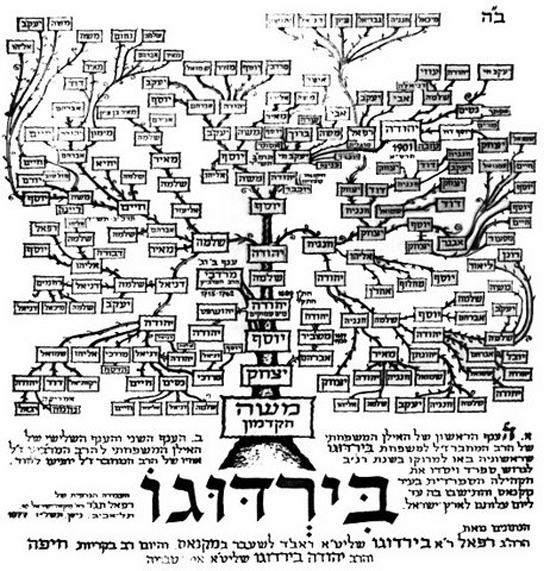Jesus is a Blue Blood.

Daveed meleck Yishra-ale: Chai, chai, vek-High-yam. When I studied in Israel during the winter of 1979-80 we went to the YMCA after the sun set on Sabbath. There, with a good number of other twenty-somethings, we danced to traditional, Israeli folk songs. “David king of Israel, He is living, His is existing” is the translation of the lyric. Still today, traditional Jews sing of David’s kingship.
History is important. Kingship is important. David is important.
“Blue bloods” use genealogical records to snobbishly taut their ancestral status. Jesus’ genealogy is not simply some tribal triumph—another poser in a world full of them. Tracing the genealogical record is necessary for one reason—legitimacy. Legitimacy is born of paternity which is bred of genealogy.
Fatherhood matters. Family matters. Jesus matters. Matthew’s genealogy matters.
- Genealogy matters. Herod the Great was always despised by the pure-blooded Jews because he was half an Edomite. Herod had the official genealogies destroyed so that no one could prove he was an illegitimate king. [1] Before we learn about Herod in Matthew 2, Matthew 1 proves Jesus IS THE legitimate King.
- Names matter. “Jesus” comes from the Hebrew word “Joshua” (yesh-U-ah) which means “Yahweh saves.” Joshua in the First (Old) Testament connects immediately to Jesus in the Second (New) Testament. Salvation was promised, salvation is now here.
- Grammar matters. 39 “was born” active verbs suddenly shift to 1 passive, “from whom was born,” in Jesus’ genealogy. Greek grammar teaches the Virgin Birth in Matthew’s first chapter.
- Genesis matters. The “beginning” of Jesus on earth in Matthew 1 is immediately reminiscent of Jesus’ creation of Earth in Genesis 1: “in the beginning” (see Colossians 1:15-17).
- Inheritance matters. The biblical narrative is full of the fact that the firstborn does not always get the birthright. Jesus comes from a long list of supposedly “second place” people—exactly the kind of people God always uses to fulfill His will. Abel over Cain, Isaac over Ishmael, or Jacob over Esau begins a long list. Jesus’ genealogy is full of folks who were not first in line. Perez, the second twin, came out on top in Matthew (see Genesis 38 and Ruth 4). Judah is mentioned rather than three brothers in front of him (Genesis 49:3-12). Boaz was second, not the first, kinsman redeemer to care for Ruth, from whom came David (Ruth 4). Matthew’s reader is reminded at Christmas: the first shall be last, the last shall be first (Matthew 19.30; 20.16).
- Personhood matters. People are specifically involved in God’s plan. Not only does Jesus save people through His life-death-resurrection but people in Jesus’ genealogy are used to fulfill Jesus’ incarnation.
- Theology matters. Some of the folks mentioned in Matthew’s genealogy do not even show up in The First Testament (see verses 13-15). It would seem that Matthew’s intention is theological over historical. Omissions in Jesus’ genealogy point toward the Hebrew mindset; we in the West think logically. In the East, Hebrews thought synthetically. What we do not understand now, may become clear later.
- Family matters. Why does Matthew begin with a genealogy? In part, Matthew continues the story that The Hebrew Race would save The Human Race.
- Legitimacy matters. Often ancient biographers would begin with a famous person’s lineage to wrap their subject in tribute. Hebrew genealogies were legal documents. One had to prove social or political standing.
- Kingship matters. Links to David as “king” begins in Matthew’s genealogy (1.7), continuing throughout the book (15.22; 21.9, 15; 27.11, 37), ending with Jesus’ pronouncement “All power is given to me” (28.18).
In The West today, paternity suits depend on biological evidence: can the mother prove the father and child’s DNA match. In The East of yesterday, paternity depended on genealogical evidence: can you show you belong. In order for the Jews to believe that Jesus could be who He said He was, royal blood had to flow through His veins.
Daveed melek Yishrael: David is king of Israel. To the Hebrew, this kingship included his son. And Jesus is David’s son. To be a son meant to be a descendent, a direct connection between what had come before and what would continue after. Fathers connect to the past, sons to the future. “Son of” suggests hope of another generation yet to come: His Name is Jesus.
And we will dance again to new words: Hey-seus melek Yishrael, Jesus is King of Israel.
Mark believes in dancing, but people do not want to see Mark dance now. Someday Mark will dance for King Jesus.
[1] William Barclay. The Gospel of Matthew. Vol. 1. Westminster, 1956
